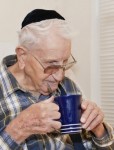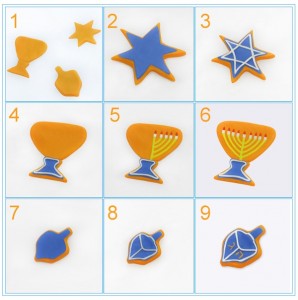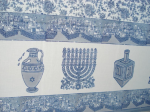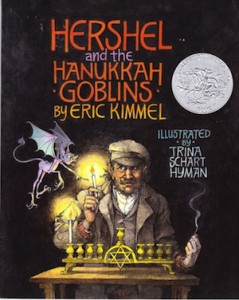(photo from chabad.org)
Bubby’s crispy latkes, Grandpa’s melodious singing and the image of multiple generations gazing at the Chanukah flames – these are among some of our most cherished memories of Chanukah. But what are we to do when someone in our family is suffering from dementia and is no longer able to celebrate the holidays as he or she once did? How can we make sure that Chanukah remains meaningful and enjoyable, as well as safe, for the whole family? In search of answers, two experts in the field of eldercare and dementia offer some advice.
Dr. Allen Power is a geriatrician who is a recognized leader in the field of dementia and other eldercare topics. He has written extensively about dementia care and has been interviewed by major media outlets such as BBC television and the Wall Street Journal.
Dan Fern is the owner of Homewatch CareGivers, a home-care services company in Phoenix. Fern’s mother is an elderly Holocaust survivor who suffers from dementia.
Menachem Posner: As we plan our celebrations with our aging family members in mind, what can we do to make the experience as smooth as possible?
Allen Power: Scheduling is important. Think about what time of day your parent or grandparent feels best, and schedule your celebration for that time. Some people feel better in the morning, and others do better in the evenings, so plan accordingly. Also, bear in mind that they may not be able to handle as long a party as they once did, so plan to have a shorter party, or at least a way for them to leave when you sense that they are beginning to tire.
Also, coach small children in advance. Help them understand the sensitivities involved, and let them know about communication issues or other limitations beforehand so that they can contribute to a positive experience.
Dan Fern: I would add that it may be better to bring the party to them instead of bringing them to the party. That will reduce the level of stimulation and allow them to enjoy the celebration in a safe, familiar environment. Also, designate someone in advance whose job it will be to act as caregiver, making sure that the parent or grandparent can take a rest or go to the bathroom when they need to.
MP: How can we deal with dietary restrictions? What do you suggest for seniors who are no longer able to cook?
AP: I don’t have a lot of concerns about food. In many cases, you can probably work around whatever restrictions there are. Even though there are some caveats, it’s important to involve people with traditions. Flavors and smells can evoke powerful memories, even for people who forget so much, so they are important.
DF: In my work, it is important that our staff help our clients participate to whatever degree possible. We may have women read recipes, stir a pot, cut veggies, or give them other roles they feel connected to. Of course, for men, we also try to help them take on at least part of the role they used to have, making sure they are not left out.
MP: What do you suggest for menorah lighting? What can we do for people who are no longer able to light on their own?
DF: My mom is 91, and she has moderate dementia. We go to her apartment and light the candles, and she loves to watch them and sing the songs. Singing is a big part of the Jewish holidays and a form of reminiscence. It has also been shown to put you in a better mood and brings oxygen to your brain. Stimulation from light, sounds and large crowds of people can be overwhelming for her, so we come to her apartment, and she thoroughly enjoys the experience. We also make sure to take out the menorah a few days in advance and leave it out where she can see it and discuss it. Just seeing the unlit menorah brings her comfort.
AP: Also make sure that you do it in a safe way. If you are afraid the person may knock over the flames, tea lights placed on a tray are a good, safe alternative.
MP: What can be done to ease the discomfort of a Chanukah gift-giver who no longer knows who gets what?
AP: If people are forgetful, never put them on the spot. Coach family members to introduce themselves when they arrive, and to do so often throughout the visit. Set things up so that they cannot make mistakes that will embarrass them. If there is gift giving, keep a written record so that they can refer to a list.
DF: And when they do make a mistake, don’t correct them; just go with it. My mom knows my name but she doesn’t know our relationship. Sometimes she calls me her nephew, and sometimes she calls me a relative. I don’t correct her. If they use the wrong name, just accept it. Of course, you can help things along by reminding your parent or grandparent beforehand what people’s names are and how they are related.
MP: How many nights of Chanukah would you suggest celebrating?
DF: It’s a unique experience every night. Even if you do exactly the same thing every night, people with dementia will not remember and will be happy to do it each time, so see them as much as you can. It’s well documented that, for people with dementia, a good mood lingers even they no longer know what caused them to feel good in the first place. Remember, you have a limited number of days to celebrate with your beloved parent or grandparent, so take advantage of all the time that is available.
AP: That’s right. One of the wonderful things about people with dementia is that they live fully in the present, so make the most of each present moment. If you want to make some visits briefer than others, that’s fine.
MP: What tips can you suggest for taking grandchildren to see grandparents with dementia?
AP: In my writings, I spend a lot of time talking about how we can model though our speech and body language, showing others how to deal with our seniors. Treat their limitations matter-of-factly and normalize them. Tell the kids, “This is Grandma, we love her and it’s OK.” Give the message that they don’t need to be fearful. You can also show respect by asking the senior for an opinion, demonstrating that this person is someone to be looked up to. Cast your parent or grandparent in the role of wise elder. Also, since people with dementia live in the moment, they tend to do well with little kids who also live in the moment.
DF: When asking questions, make sure they can answer them. Say things, like, “We use this candle to light the menorah, right?” or “Remember when we had such a great time last year?” Even if they don’t remember, they are likely to say they do. You can also engage them by using open-ended comments that allow them to respond as they see fit. With a lot of people, showing affection is very appropriate. Sit next to them, hug them, kiss them and hold their hand. Do what you can to make them feel welcomed and part of what is going on around them.
MP: With so many people living far away from parents and grandparents, what can be done to make holidays special from a distance?
AP: It depends on the person. You can always call [or] Skype, even when it’s not Chanukah. For some people, seeing a face and voice may be very reassuring. But be aware that some people may not relate to it, and seeing a loved one on a screen may be unsettling. In those cases, a handwritten letter that someone can read to them may be better.
DF: A major limitation for many older people is hearing impairment, which makes the phone and Skype difficult. Cards, drawings and pictures can often accomplish the same thing, and they can be looked at again and again.
MP: Any more advice?
AP: Most people with dementia are an open book. Look in their eyes and you can see how they are feeling and proceed appropriately.
DF: Constantly monitor the situation. Be aware of the possibility that you may be pushing the limits. They may be tired and ready for a nap. Keep close tabs, and act before things become a problem. It all comes back to the fact that we want them to have a good time, we want to make them feel comfortable and not put them on the spot. If we’re sensitive to their emotions, it can be a great Chanukah celebration. Chanukah is a time when we make and relive great memories.
AP: I hope this will help people not be fearful of bringing Chanukah to a relative with dementia. Isolation can be harmful, so I hope people take the plunge and do it well.
– This article is reprinted with permission from chabad.org.









